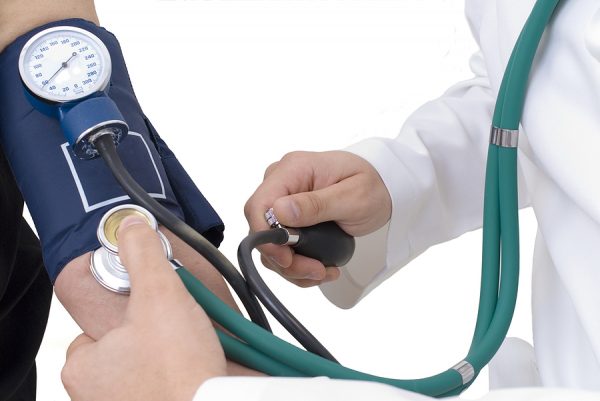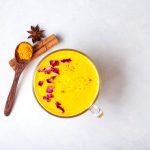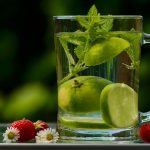Everybody knows that a high sodium intake, excess weight and lack of physical activity are all bad for their blood pressure, right? It’s because we talk about these key contributors to hypertension all of the time. But what about the ones that we seldom hear about?
For example, did you know that when you are dehydrated, it causes your blood pressure to increase? Part of the reason is due to the fact that dehydration causes the body to retain more sodium. And, as we all know, higher sodium levels are directly related to hypertension.
At the same time, dehydration causes your body to release more vasopressin than it normally would. This chemical causes blood vessels to constrict, which makes your blood pressure rise.
On top of all of that, blood becomes thicker when you are dehydrated, which further increases blood pressure.
I think this is something everyone who is battling hypertension should know about. Because, at last count, only about 22% of U.S. adults were drinking the general recommendation of eight cups (64 ounces) or more of water each day. This is already well below the Institute of Medicine’s (IOM) official recommendation of 13 cups a day for men, and nine cups a day for women.
And by the way, people 55 years of age or older – ages where high blood pressure is the most prevalent – are more likely to fall into the lower end of daily water intake, often drinking four or less cups of water each day.
Directly related to water intake is the need to pee. But guess what? If you hold your urine for extended periods of time it increases both systolic and diastolic blood pressure.
So remember to drink plenty of water, but when you feel the need to pee, don’t hold it.
Common OTC Drugs that Contribute to High Blood Pressure
Nonsteroidal anti-inflammatory drugs (NSAIDs) are some of the most commonly used drugs here in the U.S. And about 90% of all prescription NSAIDs are being taken by patients over 65.
That’s a shame, because NSAIDs are one of the biggest contributors to high blood pressure. These drugs include Aleve (naproxen), Advil (ibuprofen) and Celebrex (celecoxib). All of them come with a risk warning that they may increase your chances of a heart attack or stroke.
You have to remember that Vioxx (rofecoxib) was pulled off the market back in 2004 for this very reason. It was responsible for tens of, and possibly even hundreds of thousands of heart attacks, strokes and premature deaths as a result of its effect on blood pressure.
That being said, there are better and more natural ways to address pain than taking medications that are linked to increased risk of high blood pressure, stroke and heart attack.
Other medications, including acetaminophen, decongestants, cough and cold remedies, oral steroids, Immunosuppressants, estrogens and antidepressants, can also increase blood pressure.
3 More Surprising things that Affect Blood Pressure
Not eating enough potassium-rich foods can have a negative effect on your blood pressure. That’s because potassium offsets the effects of sodium. It helps to increase excretion of sodium, relax blood vessels and lower blood pressure.
This, in turn, reduces the risk of heart attack or stroke.
There is really no need for supplementation unless your doctor recommends it. That’s because you can get all of the potassium you need through diet.
Some potassium-rich foods include beans, lentils, avocado, sweet potatoes, acorn and winter squash, beet greens, spinach, Swiss chard, broccoli and artichokes. Kiwi, mangoes, guava, cantaloupe, prunes and bananas are also good choices.
Eating too much sugar is another contributor to high blood pressure. In one study where men consumed 200 grams of fructose daily, their blood pressure rose by about 7 mm Hg/5 mm Hg. A meta-analysis of 39 individual studies shows similar results; the effect of sugar intake increased blood pressure by an average of 6.9 mm HG/5.6 mm HG.
So make sure to read the nutritional labels on packaged foods and keep in mind that the recommendation is for women to consume less than about 24 grams (6 teaspoons) of sugar a day, and men 36 grams (9 teaspoons).
And one more thing…
A poor sleep schedule and sleep apnea are both associated with an increase in blood pressure.
While you are sleeping, your blood pressure naturally goes down. But if you don’t follow a regular sleep schedule – or if your sleep is interrupted – your blood pressure will stay higher throughout the night, and the next day as well.
With obstructive sleep apnea, it’s not just about interrupted sleep. Your airway closes and you literally stop breathing during the night. This reduces the amount of oxygen you are bringing into your body and stresses the vascular system.
All of this added stress and strain drives up your blood pressure up even further; not just during the night, but also when you are awake.
Some of the symptoms of sleep apnea include snoring, waking up gasping for breath, morning dry mouth, daytime sleepiness, headache upon wakening and difficulty paying attention during the day.
If you experience signs of sleep apnea, I highly recommend you talk to your doctor about spending a night a sleep clinic.
All of the above issues related to high blood pressure are correctable by you; so drink your water, move your body, eat the right foods and get some good sleep.
SOURCES:
Goodman AB, Blanck HM, Sherry B, Park S, Nebeling L, Yaroch AL. Behaviors and attitudes associated with low drinking water intake among US adults, Food Attitudes and Behaviors Survey, 2007. Prev Chronic Dis. 2013 Apr 11;10:E51.
Sostres C, Gargallo CJ, Lanas A. Nonsteroidal anti-inflammatory drugs and upper and lower gastrointestinal mucosal damage. Arthritis Res Ther. 2013;15 Suppl 3(Suppl 3):S3.
McCarberg BH. NSAIDs in the older patient: balancing benefits and harms. Pain Med. 2013 Dec;14 Suppl 1:S43-4.
Levings JL, Gunn JP. The imbalance of sodium and potassium intake: implications for dietetic practice. J Acad Nutr Diet. 2014 Jun;114(6):838-841.
DiNicolantonio JJ, Lucan SC. The wrong white crystals: not salt but sugar as aetiological in hypertension and cardiometabolic disease. Open Heart. 2014 Nov 3;1(1):e000167.
Perez-Pozo SE, Schold J, Nakagawa T, Sánchez-Lozada LG, Johnson RJ, Lillo JL. Excessive fructose intake induces the features of metabolic syndrome in healthy adult men: role of uric acid in the hypertensive response. Int J Obes (Lond). 2010 Mar;34(3):454-61.
Te Morenga LA, Howatson AJ, Jones RM, Mann J. Dietary sugars and cardiometabolic risk: systematic review and meta-analyses of randomized controlled trials of the effects on blood pressure and lipids. Am J Clin Nutr. 2014 Jul;100(1):65-79.
Calhoun DA, Harding SM. Sleep and hypertension. Chest. 2010 Aug;138(2):434-43.
Phillips CL, O’Driscoll DM. Hypertension and obstructive sleep apnea. Nat Sci Sleep. 2013 May 10;5:43-52.




